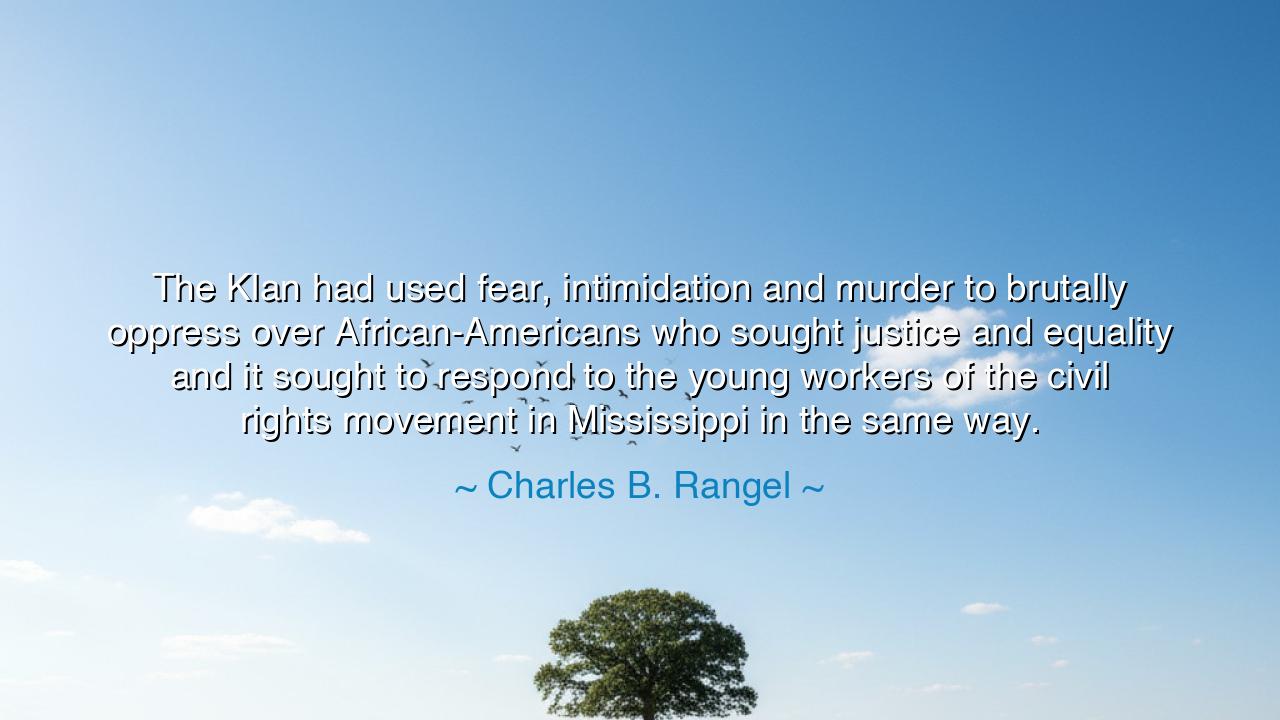
The Klan had used fear, intimidation and murder to brutally
The Klan had used fear, intimidation and murder to brutally oppress over African-Americans who sought justice and equality and it sought to respond to the young workers of the civil rights movement in Mississippi in the same way.






In the grave and unflinching words of Charles B. Rangel, a veteran of both war and the long march for civil rights, we hear the echo of America’s moral battle: “The Klan had used fear, intimidation and murder to brutally oppress African-Americans who sought justice and equality, and it sought to respond to the young workers of the civil rights movement in Mississippi in the same way.” This is not merely a recounting of history—it is a testimony, a warning, and a call to remembrance. Rangel’s words carry the sorrow of a nation that once betrayed its own creed, and the defiance of those who refused to bow before terror. For in the shadow of hate, it was the light of courage and faith in justice that kept the marchers moving forward.
The origin of this quote arises from the bitter years of the American civil rights movement, when the South burned with tension, and the dream of equality was met by the cruelty of those who feared it. The Ku Klux Klan, born after the Civil War, had long wielded the weapons of fear—hoods to hide faces, fire to mark hatred, and the rope to silence hope. Their reign of terror stretched across generations, turning night into a thing of dread for Black families who dared to claim their dignity. Rangel, a congressman from New York and a son of Harlem, spoke these words in remembrance of those years, when young activists in Mississippi—Black and white alike—braved violence and death to register voters, to open schools, and to awaken the conscience of a slumbering nation.
His words remind us that the Klan’s true power was not merely in its guns or torches, but in its intention to break the human spirit. It sought to make justice itself seem dangerous, to convince the oppressed that equality was a dream too costly to pursue. Yet history, in its relentless truth, shows that such evil cannot prevail forever. The blood that was shed became the seed of change. For every life stolen, a hundred more rose up, refusing to yield. From the ashes of churches and the tears of mothers, there emerged a strength that no terror could extinguish. The civil rights movement became a new covenant for America—a binding promise that freedom would no longer be a privilege, but a right for all.
Consider the story of James Chaney, Andrew Goodman, and Michael Schwerner, three young men of the Freedom Summer of 1964, who went to Mississippi to register Black voters. They were kidnapped and murdered by the Klan, their bodies buried in an earthen dam. The killers sought to strike fear into the hearts of the living—but instead, they kindled the outrage of a nation. Their deaths awakened America’s conscience and helped forge the Voting Rights Act of 1965, one of the greatest triumphs in the history of democracy. Thus, Rangel’s words bear witness not only to horror but to transformation—the proof that justice, though delayed, can rise even from the darkest ground.
And yet, his message is not bound to the past. The spirit of intimidation he speaks of still lingers in new forms—in prejudice masked by policy, in silence that excuses injustice, in systems that restrain rather than uplift. Rangel’s wisdom reminds us that evil rarely dies; it evolves. It disguises itself in the ordinary and waits for the righteous to grow weary. But history also teaches that progress endures only when guarded by vigilance. To forget the suffering of those who came before is to invite its return.
In his reflection, we also hear a deeper truth about fear and power. The Klan’s terror was not merely meant to kill—it was meant to silence. Yet silence is the ally of oppression, and speech, even when trembling, is the beginning of freedom. Those who marched in Mississippi, those who rode the buses in Montgomery, those who stood on bridges in Selma—all faced the same choice: to yield to fear or to rise in defiance. Their courage was not born of certainty, but of love—love for their people, their children, and the promise that one day, justice would no longer need to fight for breath.
So let this teaching be passed down to all who seek truth and goodness: never let fear define your silence, nor hatred dictate your heart. Remember the martyrs of Mississippi, the dreamers of Montgomery, the nameless souls who stood tall beneath the cross’s shadow and refused to bend. For equality is not a gift given by the powerful—it is a right defended by the brave. Each generation must fight its own battle for justice, not with fists or flames, but with conscience, compassion, and unyielding resolve.
And thus, in the solemn words of Charles B. Rangel, we hear the eternal struggle of humanity: the battle between fear and freedom, oppression and courage, silence and truth. The Klan sought to rule by terror, but it was conquered by faith, solidarity, and moral fire. Let us honor that victory by ensuring it is never undone. For when we remember the price paid for equality, we safeguard not only the past—but the soul of all generations yet to come.






AAdministratorAdministrator
Welcome, honored guests. Please leave a comment, we will respond soon